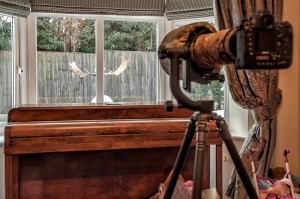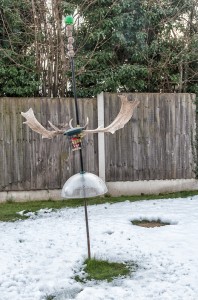26
Photographing Garden Birds in the Snow
This weekend was a busy weekend with several major commitments. I have to edit our local Parish News magazine and my daughter has a choir performance. Then there is the snow! What a fantastic opportunity to get some interesting new shots of the garden birds in a snowy setting. But here’s the rub, I’ve got so little time and the weather will probably be gone in time for my return to work. Photographing garden birds in the snow is tough but here is a tip. Shooting from the house can pay dividends and may impact on quality less than you think. It certainly allows you to keep dry and warm.
Does Shooting Through Double Glazing Have to Ruin your Images?
Shooting through your double glazed domestic window does present certain problems. It helps if they are reasonably clean, and you will have to accept a small loss of contrast and sharpness as a result of adding an extra barrier between yourself and your subject, but these effects may be less than you think if you take steps to make sure that contrast is not further reduced by shooting through reflections in the window before you. I have also found that, I suppose intuitively this would be true, that the sharper the lens I am using the better the result through the window.
Reducing Reflections
The traditional approach, for instance at a zoo, is to get your lens as close to the window as possible, to eliminate any light hitting the surface in front of the lens. This is pretty much your only recourse if you are shooting from outside in, but shooting from inside out increases your options. Clearly, you don’t want to have your lens touching the window when shooting garden birds for a couple of reasons. Firstly you will be presenting a man like image close to your subject that will frighten them and secondly you won’t be able to adjust position when your subject moves.
For my shots I discovered that I couldn’t focus on the nearest perch (my beloved antlers – thank you Jo!!) as it was too close (there is a way round this, see later) to the window anyway, so I needed to retreat into the room, way back from the window. I still had a good view, but there was more glass in front of me to reflect objects in the room. This had the added advantage of reducing my presence in the window. In fact, hiding behind my camera and the piano at the window (see production shot above) meant that I had frequent visitors to the perches. There were some reflections from objects in the room (my daughter’s playroom), but these were quite easily countered by turning off the lights in the room.
Our house has glass doors to capitalize on borrowed light, so I was getting an annoying reflection from the front door which also has glass panelling. Drawing the curtains over the front door removed these completely. In a way, you want your windows to be reflecting black, so another tip is cover up any highlights in the room you are shooting in with black sheets, either of paper, or perhaps a black panel reflector or two if you have them lying around. The ideal scenario would be a black painted room with no contents, though this is unlikely to find favour with the spouse or partner.
Finally it is best if the window that you are shooting through doesn’t have direct sunlight shining onto it as this reduces your chances of getting the light levels in your room down to a reasonable level, and causes reflections and flare on the window itself. It’s not so easy to fit a lens hood to a window frame!!
The Setup
For photographing garden birds in the snow I used the following setup. I had my D4 on a Gitzo Carbon Fibre Tripod (though any would have done), with a Wimberley Gimbal head Mk II, and a 600mm f4 Nikkor lens, though I could have used something like a 70-200mm f2.8 with a 2x teleconvertor. This would have had the advantage of a close focus point so I wouldn’t have had to be so far back in the room. On the question of how to make the 600mm nearest focus point closer to the front of the lens, the solution is simply to add an extension ring between the lens and the camera body. You will lose a small amount of light, and you may lose infinity focus, but this doesn’t really matter in a situation like this where nothing is too far away.
Gallery
This slideshow requires JavaScript.
Cheers,
R.




Recent Comments